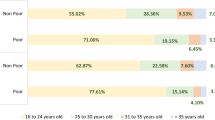Abstract
Recent research has suggested that the occupational prestige of working wives influences their perceptions of personal social status beyond the effects of husbands' occupation. The present study uses data from the National Opinion Research Center General Social Surveys for 1973–1977 and incorporates stratification characteristics ignored in previous work. The results are consistent with past findings in that wives' occupational achievements had no impact on either the subjective class or political party identifications of husbands. Contrary to previous results, working wives' occupational prestige, while affecting their political party choice, had no independent effect on their perception of personal social status. The educational attainments of working wives, however, did affect their social class identification. Attempts at resolution of the apparent discrepancy between past and present findings are presented and implications are discussed.
Similar content being viewed by others
References
Acker, J. Women and social stratification: A case of intellectual sexism. American Journal of Sociology, 1973, 78, 936–945.
Barth, E. A. T., & Watson, W. B. Social stratification and the family in mass society. Social Forces, 1967, 45, 392–402.
Bruce, J. D., & Rodman, H. Black-white marriages in the United States: A review of the empirical literature. In I. R. Stuart & L. E. Abt (Eds.), Interracial marriage: Expectations and realities. New York: Grossman, 1973.
Davis, K. Human society. New York: Macmillan, 1949.
DeFronzo, J., & Warkov, S. Are female-headed households energy efficient: a test of Klausner's hypothesis among Anglo, Spanish-speaking and black Texas households. Human Ecology, 1979, 7, 191–197.
Duncan, O. D. A socioeconomic index for all occupations, and properties and characteristics of the socioeconomic index. In A. J. Reiss, Jr. (Ed.), Occupations and social status. New York: The Free Press, 1961.
Glenn, E. N., & Feldberg, R. L. Where is she and who does she think she is? A framework for analyzing the class consciousness of women workers. Unpublished paper, Boston University, 1978.
Haug, M. Social class measures and women's occupational roles. Social Forces, 1973, 52, 86–98.
Heer, D. M. The prevalence of black-white marriage in the United States, 1960 and 1970. Journal of Marriage and the Family, 1974, 36, 246–260.
Hiller, D. V., & Philliber, W. W. The derivation of status benefits from occupational attainments of working wives. Journal of Marriage and the Family, 1978, 40, 63–71.
Hodge, R. W., Siegel, P. M., & Rossi, P. Occupational prestige in the United States: 1925–1963. American Journal of Sociology, 1964, 70, 286–302.
Mahoney, E. R., & Richardson, J. G. Perceived social status of husbands and wives: the effects of labor force participation and occupational prestige. Sociology and Social Research, 1979, 63, 364–374.
Parsons, T. A. Revised analytical approach to the theory of social stratification. In T. Parsons (Ed.), Essays in sociological theory. New York: The Free Press, 1954.
Philliber, W. W., & Hiller, D. V. The implications of wife's occupational attainment for husband's class identification. Paper presented at the Annual Meetings of the American Sociological Association, Chicago, 1977.
United States Bureau of the Census. Statistical abstract of the United States. Washington, D.C.: U.S. Government Printing Office, 1978.
Vanneman, R., & Pampel, F. C. The American perception of class and status. American Sociological Review, 1977, 42, 422–437.
Watson, W. B., & Barth, E. A. T. Questionable assumptions in the theory of social stratification. Pacific Sociological Review, 1964, 7, 10–16.
Author information
Authors and Affiliations
Rights and permissions
About this article
Cite this article
DeFronzo, J. Differences in the determinants of husbands' and working wives' class and political party identifications. Sex Roles 7, 355–361 (1981). https://doi.org/10.1007/BF00288064
Issue Date:
DOI: https://doi.org/10.1007/BF00288064




